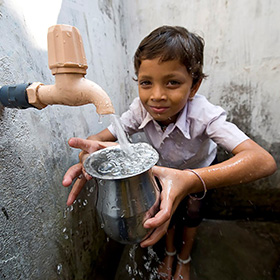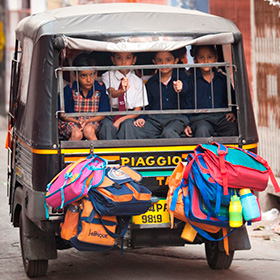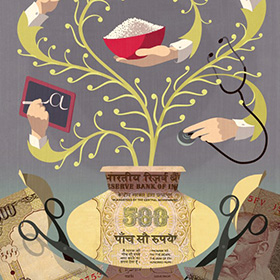Features
Why Indian Nonprofits Are Experts at Scaling Up

There might be no better laboratory than India for studying the challenges that nonprofits face in trying to scale up when resources are scarce. And there might be no better guide than Indian nonprofits for how to successfully overcome those challenges and become effective agents of social change.
Water Is Power

When is a water and sanitation program more than just a water and sanitation program? A project undertaken by Gram Vikas shows how efforts to solve a particular social problem can have a far-reaching impact on an entire social system. Indeed, it can open new ways to reduce deeply entrenched forms of inequality.
Photo Essay: The Many Faces of Learning

One of India's biggest assets is its youth. It boasts the largest population of young people in the world. But along with that comes the challenge of educating a population that is not just large, but also diverse.
Cutting Costs to Increase Impact

Focusing on reducing costs can be the key to unlocking results at greater scale. nonprofits in India and the United States provide important lessons for NGOs around the world on just how to do that.
A New Approach to Gender-Lens Grantmaking

India provides particularly fertile ground for the gender-lens movement, which is beginning to fund culturally tailored efforts to transform underlying beliefs that systematically disempower females.
Spotlight on Sanitation
Fixing India's Sewage Problem
Sewage treatment systems are being built that are simpler and less expensive.
Engaging Citizens to Improve Sanitation
The Aga Khan Development Network is empowering communities.
Fostering Sustainable Sanitation
Gramalaya combines community mobilization with education and microfinance.
The Power of Women's Collectives
MHT helped launch a community-driven initiative to improve sanitation.
Q&A
Rohini Nilekani
Two decades of giving have taught philanthropist Rohini Nilekani the value of pursuing unconventional approaches to tackling social problems. (For more about Rohini Nilekani, explore her Remarkable Givers: India video interview series.)
Ratan Tata
Since becoming chairman of Tata Trusts, Ratan Tata has shifted the Trusts' focus from charitable work to programs that seek to transform lives. (For more about Ratan Tata, explore his Remarkable Givers: India video interview series.)
Case Studies
Arghyam
Arghyam, a grantmaking foundation, takes a data-driven approach to helping transform India's water and sanitation systems.
Saathi
Hindi for "friend," the Saathi Internet program enables women in rural Indian to help other women improve their lives and livelihoods.
Viewpoints
Creating a Social Business
How Jaipur Living developed a global rug business, one weaver at a time, and lifted thousands out of poverty.
From the Ground Up
Top-down development doesn't work. What's needed is a "pull model" created by locals, funders, and government agencies working together as equals.
Scaling with Evidence
When monitoring and evaluation are in an organization's DNA, as they are at SNEHA, it's much easier to create partnerships with government agencies and NGOs.
Deploying Technology
Technology alone is not the innovation. Rather, the innovation lies in how technology is deployed.
Further Reading
- For non-profits, scaling up directly linked to partnering with govt: Bridgespan report, by Seema Chowdhry, Live Mint (February 21, 2017)
- Mindset over matter: Indian nonprofits that know how to grow, by Soumitra Pandey and Rohit Menezes, Forbes India (February 20, 2017)
- Indian NGOs offer food for thought for world, US social sector, by Rupali Mukherjee, The Times of India (February 18, 2017)
- These 5 Mindsets Make Nonprofits Successful, by Ben Paynter, Fastcoexist.com (February 16, 2017)
